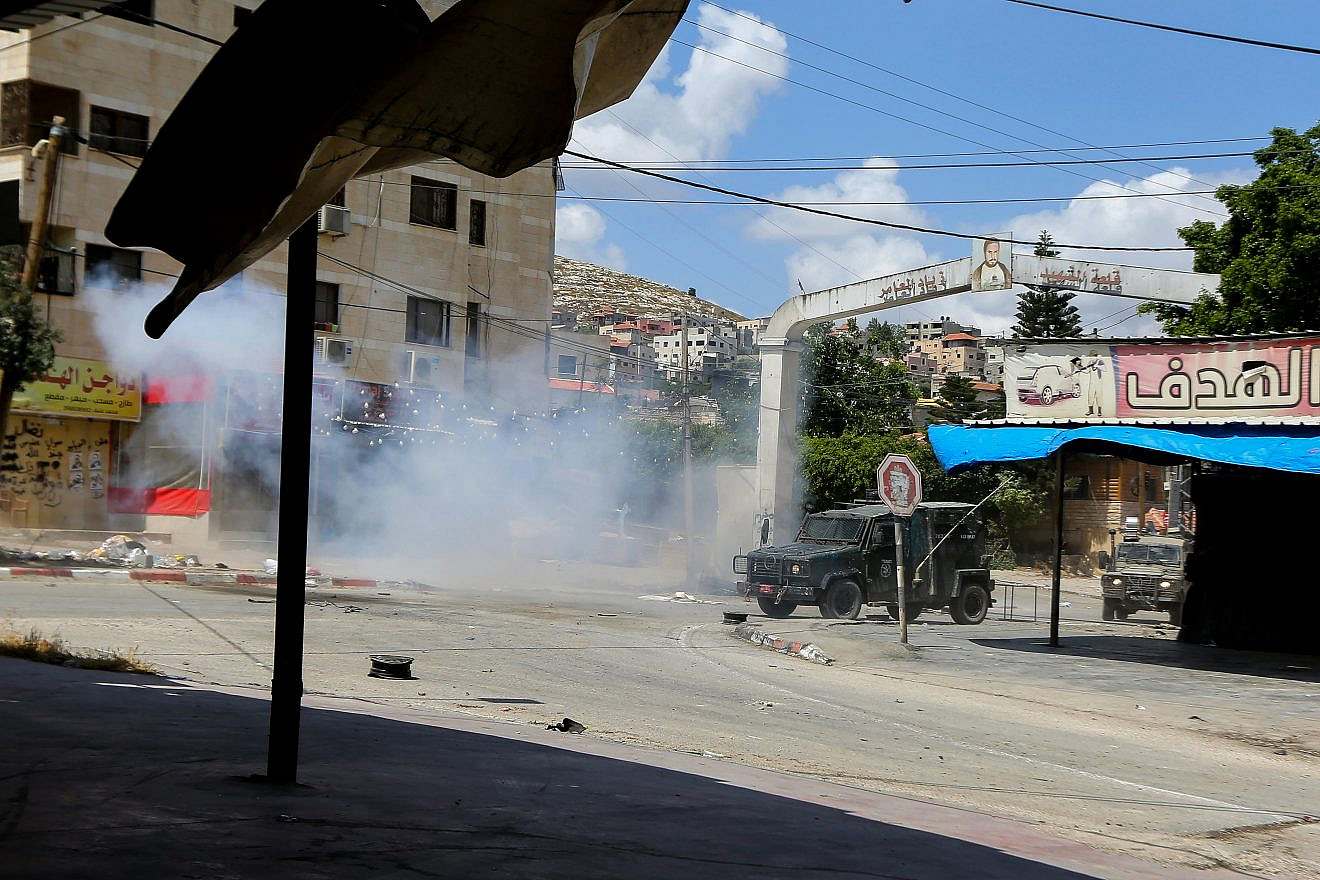by Baruch Yedid
"If you do something again and again in the same specific way, the enemy will adapt. That’s the real story here," expert says.
 |
| Israeli military vehicles seen during clashes between Israeli security forces and Palestinians in the West Bank city of Jenin, on June 19, 2023. Photo by Nasser Ishtayeh/Flash90. |
The use of a specialized 88 pound bomb in an ambush of Israeli soldiers in Jenin on Monday indicates an escalation of Palestinian terror, at least according to Palestinian leaders. But one Israeli analyst is questioning that thinking.
Seven Israeli soldiers were injured by an explosive buried under the road during an arrest raid in the northern Samarian city. According to the Israel Defense Forces, the bomb was considerably larger than those normally used by Palestinian terror factions. The Iran-backed Palestinian Islamic Jihad claimed responsibility for placing the bomb.
After the explosion, the IDF was forced to call in an air strike by an Apache gunship to cover the evacuation of the wounded. It was the first time since 2002 that the military used combat helicopters to carry out air strikes in Judea and Samaria.
The terror groups of Jenin and northern Samaria, it has emerged, have gained experience in identifying IDF weak points, mapping out expected routes and waiting areas, and using more sophisticated explosives. Cameras have also been stationed to monitor targeted vehicles.
The Palestinian Authority governor of Jenin, Akram Rajoub, told the Tazpit Press Service that “resistance to the IDF is increasing and the armed squads are gaining a lot of experience, and it seems that they have located the IDF’s weak points.”
PIJ Secretary General Ziad al-Nakhla said from Iran on Monday that the battle in Jenin “is of great importance, because despite the modest abilities, the heroes of Jenin proved their high ability.”
There is further evidence of the preparation of more explosives in the Jenin area by both PIJ and the Popular Front For the Liberation of Palestine.
Several weeks ago, PIJ placed an explosive charge very close to the place where the Israeli vehicles were ambushed on Monday. TPS has learned that the terror group took advantage of the soft ground where there is no asphalt, on a dead-end road.
While visiting the wounded soldiers, Israeli Defense Minister Yoav Gallant said on Tuesday that “all options are on the table.”
Changing the rules of the game
However, Yair Ansbacher, a PhD candidate in modern warfare at Ariel University, told TPS that Monday’s ambush reflects armed Palestinian groups identifying patterns in IDF activity and adapting accordingly.
“The Palestinians are learning the modus operandi of the IDF. It’s a basic concept of warfare not to do something twice, or of course the same thing three times. If you do something again and again in the same specific way, the enemy will adapt. That’s the real story here,” said Ansbacher.
“So in a way, it’s a good thing what we saw yesterday, because the price was not as heavy as it could have been. It could easily have been a horrible disaster. A lot of people could have died. People didn’t die, they got wounded, and that’s the price you have to pay for being a late learner, a late adapter. The IDF will have to change its way of working in the northern Samaria area,” he added.
Asked how the IDF would respond, Ansbacher said, “I would look closely in the areas of Judea and Samaria in the next few days because the IDF will probably try to do something else, something different.”
He dismissed the ambush as an escalation, saying that would involve risks to PIJ and other armed groups that Iran is not ready to accept at this time.
“The proxies are a kind of insurance” for Tehran against an Israeli strike on Iranian nuclear facilities, said Ansbacher.
He also questioned PIJ’s claim of responsibility, noting that there’s no clear terror hierarchy in Jenin or northern Samaria.
“Nobody really knows who exactly is the leader in the north Samaria area. There are a bunch of terror and crime organizations. The IDF is calling them gunmen, armed groups and of course terrorists from different organizations. It’s kind of a phenomenon there,” he said.
As for Iran’s connection to the ambush, Ansbacher said, “I’m not really sure we can draw the line between those dots as much as they would like us to think.”
Asked about Israeli deterrence, Ansbacher stressed that, “In the end, it comes down to a matter of will. The IDF could take Jenin, the whole area, in a couple of hours, if they want. It’s not a matter of strength or deterrence, it’s a matter of making the [political] decision. The IDF and Israel will have to decide if they want to change the rules of the game, or if they want to play by the rules of the Palestinians, the Iranians and others.”
Since day one, he continued, Israel had been at war in the region.
“We were never accepted here, we were never welcomed here. Nothing really changed,” he said.
The consequences, he insists, of waiting too long to change the rules of the game is, “more of what we saw yesterday.”
Baruch Yedid
Source: https://www.jns.org/jns/topic/23/6/20/296714/
No comments:
Post a Comment